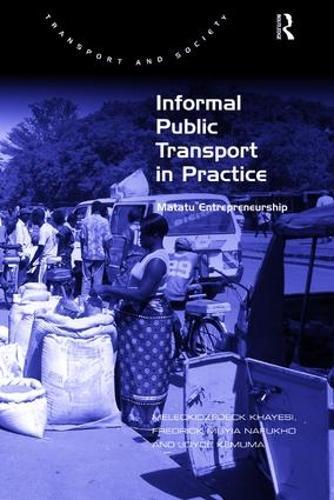Overview
Transport discourse often concentrates on what is missing from transport policy and practice in developing countries vis-Ã -vis high-income countries rather than articulating local creativity in responding to transport needs as revealed in informal public transport modes such as matatu, motorcycle, bicycle and animal transport. This book helps to correct some of the tendency of inadequate contextualization of knowledge, technology and practice learning and transfer from one setting to another in transport and other development programmes. While countries such as Kenya have ambitions to develop their transport systems to fit into the globalized transport system, they also need to plan transport for ordinary life in both urban and rural areas. The matatu service, provided by privately-owned transport carriers, can be seen as a mirror of the life of Kenya, revealing how indigenous African entrepreneurship and capitalism straddles various economic, political and social systems. This book offers a phenomenological and situated analysis of the matatu entrepreneurship in the political economy of Kenya and its embeddedness in society. By adopting a social science approach, this book highlights a number of political, social and practical issues to demonstrate the matatu is not a decontextualized, disembodied and lifeless piece of moving metal carrying people and goods but rather part of a self-organizing industry, with its own logic of practice. This book is dedicated to Ajanga Khayesi.
Full Product Details
Author: Meleckidzedeck Khayesi ,
Fredrick Muyia Nafukho ,
Joyce Kemuma ,
Professor Margaret Grieco
Publisher: Taylor & Francis Ltd
Imprint: Routledge
Edition: New edition
Weight: 0.460kg
ISBN: 9781409446927
ISBN 10: 1409446921
Pages: 164
Publication Date: 28 August 2015
Audience:
College/higher education
,
Professional and scholarly
,
Postgraduate, Research & Scholarly
,
Professional & Vocational
Format: Hardback
Publisher's Status: Active
Availability: In Print

This item will be ordered in for you from one of our suppliers. Upon receipt, we will promptly dispatch it out to you. For in store availability, please contact us.
Reviews
'For too long, the world of transport planning, policy and analysis has been dominated by what happens in the USA or UK and the geographical lop-sidedness is compounded by an emphasis on methodology, car traffic, infrastructure and the possibilities around modal shift. This is very worthy but the world is richer and more diverse than this menu suggests. This book about matatu minibuses in Kenya is therefore a breath of fresh air which takes us all into a new dimension of thinking. What is the matatu? How does it work? Why does it straddle legality and illegality? How does it relate to the world of regulated, orderly public transport? This book explores all these questions and much more and is a most welcome piece of work. We need more of this freshness and vigour in transport writing and a deeper understanding of the social and economic circumstances that bring transport services to people who need them in parts of the world that are not yet colonized by global bus or train companies. The authors are to be congratulated and I hope others will follow suit.' John Whitelegg, Stockholm Environment Institute, York University, UK 'Drawing on qualitative and political economy frameworks, the authors take a holistic approach to studying matatu entrepreneurship as a self-organizing industry with a distinctive culture and strategy. A timely study which those interested in business in the new Africa will find useful.' Kenda Mutongi, Williams College, USA
'For too long, the world of transport planning, policy and analysis has been dominated by what happens in the USA or UK and the geographical lop-sidedness is compounded by an emphasis on methodology, car traffic, infrastructure and the possibilities around modal shift. This is very worthy but the world is richer and more diverse than this menu suggests. This book about matatu minibuses in Kenya is therefore a breath of fresh air which takes us all into a new dimension of thinking. What is the matatu? How does it work? Why does it straddle legality and illegality? How does it relate to the world of regulated, orderly public transport? This book explores all these questions and much more and is a most welcome piece of work. We need more of this freshness and vigour in transport writing and a deeper understanding of the social and economic circumstances that bring transport services to people who need them in parts of the world that are not yet colonized by global bus or train companies. The authors are to be congratulated and I hope others will follow suit.' John Whitelegg, Stockholm Environment Institute, York University, UK 'Drawing on qualitative and political economy frameworks, the authors take a holistic approach to studying matatu entrepreneurship as a self-organizing industry with a distinctive culture and strategy. A timely study which those interested in business in the new Africa will find useful.' Kenda Mutongi, Williams College, USA
Author Information
Meleckidzedeck Khayesi, Transport Researcher, Geneva, Switzerland, Fredrick Muyia Nafukho, Texas A&M University, USA and Joyce Kemuma, Hogskolan Dalama University, Sweden.




